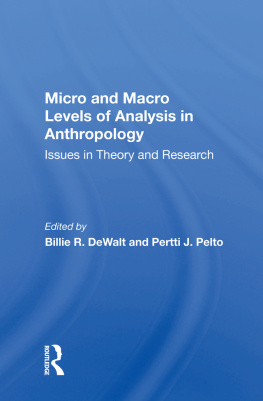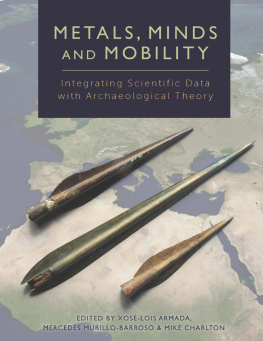Micro and Macro Levels of Analysis in Anthropology
Westview Special Studies
The concept of Westview Special Studies is a response to the continuing crisis in academic and informational publishing. Library budgets are being diverted from the purchase of books and used for data banks, computers, micromedia, and other methods of information retrieval. Interlibrary loan structures further reduce the edition sizes required to satisfy the needs of the scholarly community. Economic pressures on university presses and the few private scholarly publishing companies have greatly limited the capacity of the industry to properly serve the academic and research communities. As a result, many manuscripts dealing with important subjects, often representing the highest level of scholarship, are no longer economically viable publishing projects--or, if accepted for publication, are typically subject to lead times ranging from one to three years.
Westview Special Studies are our practical solution to the problem. As always, the selection criteria include the importance of the subject, the work's contribution to scholarship, and its insight, originality of thought, and excellence of exposition. We accept manuscripts in camera-ready form, typed, set, or word processed according to specifications laid out in our comprehensive manual, which contains straightforward instructions and sample pages. The responsibility for editing and proofreading lies with the author or sponsoring institution, but our editorial staff is always available to answer questions and provide guidance.
The result is a book printed on acid-free paper and bound in sturdy, library-quality soft covers. We manufacture these books ourselves using equipment that does not require a lengthy make-ready process and that allows us to publish first editions of 300 to 1000 copies and to reprint even smaller quantities as needed. Thus, we can produce Special Studies quickly and can keep even very specialized books in print as long as there is a demand for them.
About the Book and Editors
Arguing that there are insufficient theoretical and methodological guidelines for articulating microlevel and macrolevel analyses of sociocultura1 phenomena, contributors to this volume review the history of micro/macro issues in anthropology and provide a framework for a more systematic examination of potential linkages among levels. In addition, they provide empirical examples of the articulation of micro/macro theory and methods in sociocultural research that illustrate how the behavior of individuals and local communities affects and is affected by larger units and processes. These studies demonstrate that many theoretical and methodological debates in the social sciences implicitly are arguments about scale and/or level of analysis that arise from an inadequate understanding of the complementarity of analyses on different dimensions. A final essay draws together guidelines for integrating microlevel and macrolevel analyses.
Billie R. DeWalt is a professor of anthropology and rural sociology and is acting director of the Latin American Studies Program at the University of Kentucky. Pertti J. Pelto is professor of anthropology and community medicine at the University of Connecticut.
To Jennie M. DeWalt and Jenny M. Pelto and to the memory of Harry E. DeWalt and Jaakko J. Pelto
Micro and Macro Levels of Analysis in Anthropology
Issues in Theory and Research
edited by
Billie R. DeWalt and
Pertti J. Pelto
First published 1985 by Westview Press, Inc.
Published 2018 by Routledge
52 Vanderbilt Avenue, New York, NY 10017
2 Park Square, Milton Park, Abingdon, Oxon OX14 4RN
Routledge is an imprint of the Taylor & Francis Group, an informa business
Copyright 1985 Taylor & Francis
All rights reserved. No part of this book may be reprinted or reproduced or utilised in any form or by any electronic, mechanical, or other means, now known or hereafter invented, including photocopying and recording, or in any information storage or retrieval system, without permission in writing from the publishers.
Notice:
Product or corporate names may be trademarks or registered trademarks, and are used only for identification and explanation without intent to infringe.
Library of Congress Cataloging in Publication Data
Main entry under title:
Micro and macro levels of analysis in anthropology.
1. Ethnology--Philosophy--Addresses, essays, lectures.
2. Ethnology--Methodology--Addresses, essays, lectures.
I. DeWalt, Billie R. II. Pelto, Pertti J.
GN345.M53 1985 306.01 85-10683
ISBN 13: 978-0-367-00621-1 (hbk)
Contents
Billie R. DeWalt and Pertti J. Pelto
John W. Bennett
Richard N. Adams
Frank Cancian
Carol A. Smith
Susan C. M. Scrimshaw
Scott Whiteford and Laura Montgomery
Billie R. DeWalt
Pertti J. Pelto and Billie R. DeWalt
Guide
As editors, we accept full responsibility for the content of this book. Nevertheless, this volume represents the culmination of an effort that involved many different individuals. Most important has been the contribution of Sara Alexander. Her patience and forbearance in coping with multiple drafts of papers and the many details to which attention must be paid are very much appreciated. Without her efforts, this book would not have been finished.
Thanks also go to Teresa Epperson and Andrea Allen for their assistance in the typing of drafts and some of the tables, Nancy Merryman who prepared the index, and Gyulius Pauer of the University of Kentucky Cartographic Laboratory who prepared some of the figures. Our families, Saara, Gareth and Kathleen Musante DeWalt and Ari, Jon and Gretel Pelto were quite patient with us as we struggled to complete this project.
Finally, we must thank the authors of the essays presented here. Their work has served as a source of stimulation for our thinking about issues of microlevel/macrolevel linkages and we are pleased to be able to present their work in this context.
Billie R. DeWalt
Pertti J. Pelto
Richard N. Adams is Rapaport Centennial Professor of Social Sciences at the University of Texas at Austin. He has been President of the American Anthropological Association, the Latin American Studies Association and the Society for Applied Anthropology. He has published on the subjects of power, energy, and cultural evolution. His books include Paradoxical Harvest (1982), La Red de la Expansion Humana (1978), Energy and Structure (1975) and Crucifixion by Power (1970).
John w. Bennett is Professor of Anthropology at Washington University of St. Louis, Missouri and a program associate at the Land Tenure Center of the University of Wisconsin, Madison. He has been President of the American Ethnological Society and the Society for Applied Anthropology. His publications include work on ecology and economics, communal societies, and agrarian development. His books include Of Time and the Enterprise (1982), The Ecological Transition; Cultural Anthropology and Human Adaptation (1976), Northern Plainsmen: Adaptive Strategy and Agrarian Life (1969) and Hutterian Brethren (1967).
Frank Cancian is a Professor of Anthropology in the School of Social Sciences at the University of California at Irvine. He has served as President of the Society for Economic Anthropology and has published in the areas of economic anthropology, social stratification, and peasant societies. His books include The Innov ator's Situation (1979), Change and Uncertainty in a Peasant Economy (1972) and Economies and Prestige in a Maya Community (1965).





